Pia Salvia Offers New Translations of 'What' a Harp Can Do
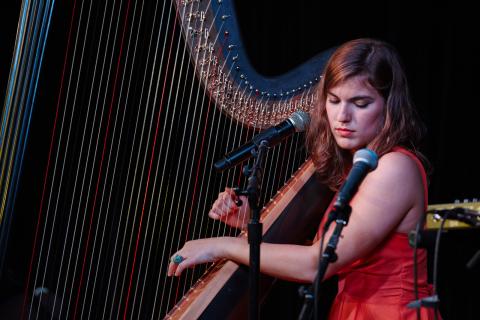
Belgian harpist Pia Salvia performs her eclectic blend of jazz, classical, Latin, flamenco, and vocal pop at a recent concert in the Berk Recital Hall.
Dave Green
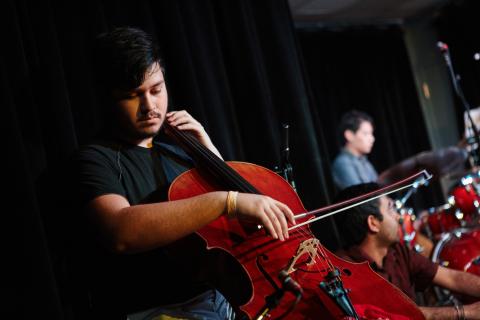
Cellist Cristobal Cruz-Garcia from Tijuana, Mexico, joins Salvia for her original composition, "Mountain Song."
Dave Green
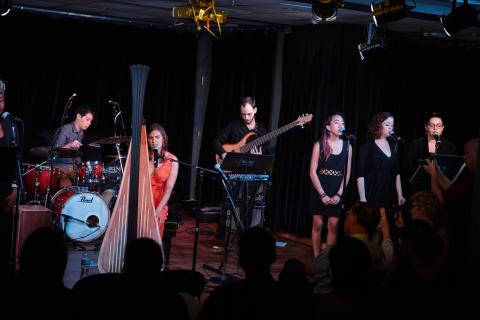
Salvia's diverse band included electric bass, kit drums, auxiliary percussion, and six vocalists.
Dave Green
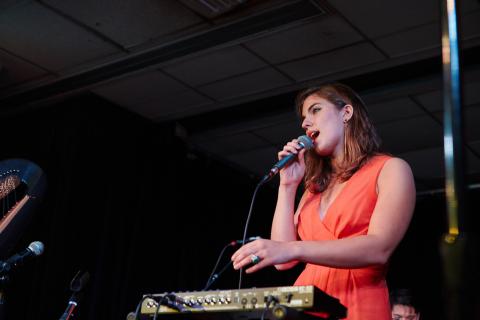
Adding yet another layer to her genre-bending performance, Salvia loops her own vocal tracks live, using a sampler.
Dave Green
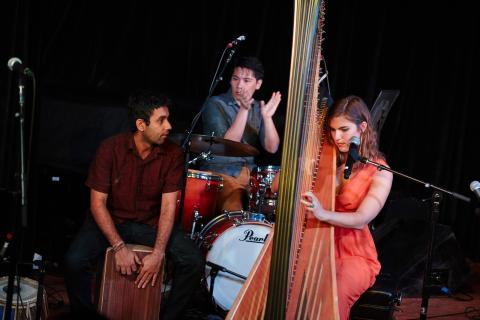
Salvia's percussion accompaniment came by way of Eugene Seow on the drum kit and M. T. Aditya Srinivasan on cajón and tabla.
Dave Green
When Pia Salvia, Belgian harpist and performance major, was planning her fall semester concert in the Berk Recital Hall, she originally titled the event “Quoi?”—French for “What?”—as a placeholder. She hadn’t yet determined how best to encapsulate a performance that would showcase the classical training she began at age 7 as well as a kitchen-sink’s worth of musical elements—including jazz, flamenco, Latin grooves, tabla, cello, cajón, and vocals—she’s gathered from Berklee and around the world.
Salvia eventually decided on the title “Pia’s Mardi” (“Tuesday with Pia”), but through a logistical oversight forgot to update the concert listing and, thus, the event remained billed as the enigmatic “Quoi?”
Given the divergent range of styles that coalesced into a set that was not only coherent but thoroughly intoxicating, one can say that the accidental title’s question is an appropriate response to just what it is Salvia is up to, musically and artistically.
The concert, which featured six female vocalists and a vocal sampler, opened with a languid arrangement of the jazz standard “Summertime,” with Salvia's fluid, dreamlike harp arpeggios acting like a flashback sequence in a film, effectively transporting the November audience back to a warm, breezy time of year when "the livin' is easy.” Despite the song’s jazz lineage, there was a twinge of roots music in the opening, and somehow when the tabla entered, eventually giving way to the drum kit’s rimshot groove, nothing felt out of place, and we might as well have been swaying to a lethargic wind curving its way through a summer field.
Global Roads to Roam
Salvia’s road to Berklee has been a curvy one, but she seems to go out of her way to find unexpected detours. “I need to move,” she says. “Some people, they like to have a regular [schedule]. I cannot.”
At age 18, after 10 years of classical training in her home city of Brussels, she spent a gap year in Cuba, flying back to Belgium periodically to prepare for a music competition that she would go on to win. She spent the next year in an intensive program at the Music Academy International in Nancy, France, one of Europe's foremost teaching, performing, and recording facilities as well as a partner school with the Berklee International Network. While there, she caught the eye of a talent scout who frequented the program, and was recruited for a spot on the French edition of the popular vocalist reality show The Voice. The experience opened up a direction to pop stardom, something she considered, but ultimately moved away from, given the limits of creative and personal freedom it would impose.
From Student to 'Maestra'
In 2013, after her stint on The Voice, Salvia found out about Berklee’s Five-Week Summer Performance Program, and with funding from the Harp Help Foundation in Luxembourg, she arranged to come to Boston to work with Felice Pomeranz, professor in Berklee's String Department. The experience was the antidote to the pop star direction she’d considered taking in France, as it afforded her the chance to pursue her growing web of musical interests, including jazz and Latin music. She then set about returning in summer 2014, this time as a matriculated student.
According to Pomeranz, Salvia “is the kind of student we, as teachers, all hope to have. She is interested in learning everything—technique, style, rhythm, phrasing, all aspects of music.” Berklee’s programming is a perfect fit for Salvia’s wide-eyed musical curiosity, and she’s wasted no time in taking advantage of her time here. Only in her fourth semester, she’s already studied at Berklee’s Valencia, Spain, campus in the spring of 2015 in order to focus on flamenco. And this summer she spent time studying in Brazil and Colombia, an experience that culminated with an invitation to lead a master class in Colombia at the end of August. “I went from student to maestra [“teacher”],” she says proudly. Speaking to why Berklee is such a good fit for her global interests, she goes on to say, "You meet so many people from all around the world [at Berklee], so you know that if you’re going somewhere, you probably know at least one person from that country."
Stringing the Elements Together
After the enchantment of “Summertime,” Salvia kept her audience spellbound through four original songs that contained everything from beat boxing and spoken word to the cello and cajón.
“Pia is very versatile,” Pomeranz says. “I know her ability to put all the elements she has learned at Berklee together will serve her well as an up-and-coming international performer.” As she moves ahead in her career, Salvia wants to expand the versatility that she's cultivated in her music while at Berklee, saying she'd "like to like to start a school in Europe teaching modern harp,” aimed at giving other harp students the exposure to global music that she's experienced. And through her music and performances she hopes to "show what is possible with the harp—that it is not only a classical instrument ... I love the surprised faces when people think: 'this is not classical?’”
And in that spirit of surprise, Salvia finished the show with her arrangement of Britney Spears’s “Toxic”—perhaps a wry nod to the pop career she’d once flirted with. Under her care, the earworm pop tune turned into a sprawling, complex blend of beguiling harmonies and rhythms, concluding with a searing harp solo. The end result was sublime and contained, unsurprisingly, a certain je ne sais quoi.
Watch Salvia perform her original song, "Moody:"
